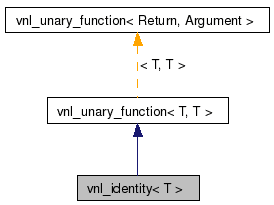#include <vnl_identity.h>
Inheritance diagram for vnl_identity< T >:

Public Member Functions | |
| vnl_unary_function< T, T > * | Copy () const |
| Copy should allocate a copy of this on the heap and return it. | |
| T | f (T const &x) |
| Apply the function. | |
| virtual T | get_range_min () const |
| Return bounding cube of range (outputs). | |
| virtual T | get_range_max () const |
Detailed Description
template<class T>
class vnl_identity< T >
Definition at line 21 of file vnl_identity.h.
Member Function Documentation
template<class T>
| vnl_unary_function<T,T>* vnl_identity< T >::Copy | ( | ) | const [inline, virtual] |
Copy should allocate a copy of this on the heap and return it.
If Subclasses do not implement this function, it will return null, but many applications will never call it, so this may not be a problem for you.
Reimplemented from vnl_unary_function< T, T >.
Definition at line 24 of file vnl_identity.h.
template<class T>
| T vnl_identity< T >::f | ( | T const & | i | ) | [inline, virtual] |
Apply the function.
The name is "f" rather than operator(), as the function will generally be called through a pointer. Note that the function is NOT const when you subclass.
Implements vnl_unary_function< T, T >.
Definition at line 30 of file vnl_identity.h.
| virtual T vnl_unary_function< T , T >::get_range_max | ( | ) | const [virtual, inherited] |
Return bounding cube of range (outputs).
| virtual T vnl_unary_function< T , T >::get_range_min | ( | ) | const [virtual, inherited] |
Return bounding cube of range (outputs).
The documentation for this class was generated from the following file:
- core/vnl/vnl_identity.h
 1.7.5.1
1.7.5.1